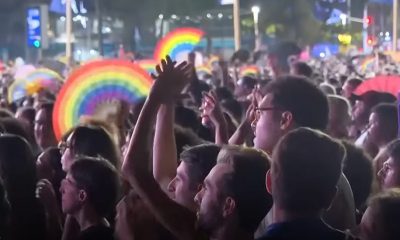South America
Bolsonaro ‘will destroy democracy’ in Brazil if re-elected
LGBTQ, intersex activists back Lula ahead of Oct. 30 runoff

Editor’s note: International News Editor Michael K. Lavers was on assignment in Brazil from Sept. 30-Oct. 11.
RIO DE JANEIRO — Michelle Seixas, the national political coordinator of Articulação Brasileira de Lésbicas (Brazilian Articulation of Lesbians), a group that advocates on behalf of lesbians in Brazil, was born in Complexo do Alemão, a complex of favelas in the northern part of Rio de Janeiro.
She spoke with the Washington Blade about her life, her work and Brazil’s presidential election on Oct. 10 during an interview at Espaço Democrático de União, Convivência, Apprendizagem e Prevenção (Democratic Space of Union, Coexistence, Learning and Prevention,) a community center in Complexo do Alemão known by the acronym EDUCAP that Prince Harry officially opened in 2012.
Local drug dealers built the soccer field that is next to EDUCAP. The Blade also saw public housing along one of Complexo do Alemão’s main streets that former President Luiz Inácio Lula da Silva’s government built through its Programa Minha Casa, Minha Vida (My House, My Life Program.)
“(President Jair) Bolsonaro to lesbian women in Brazil is the worst president in Brazil’s history,” Seixas told the Blade.
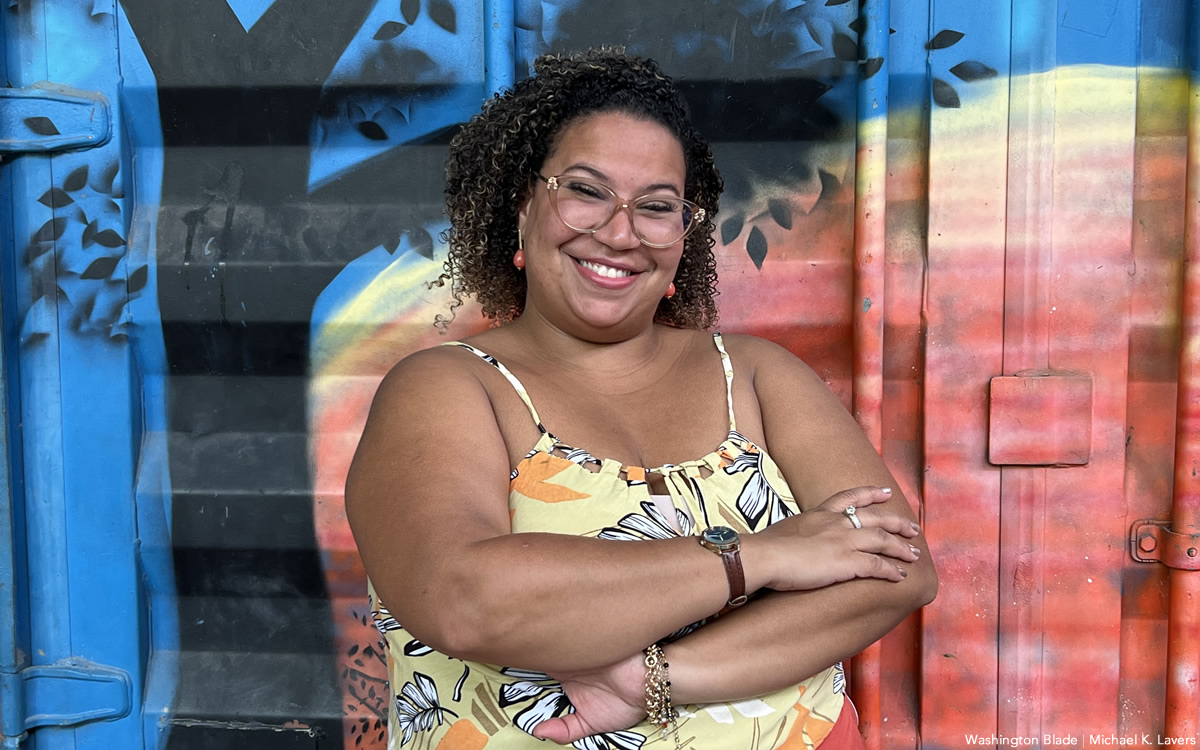
Mariah Rafaela Silva, a transgender woman of indigenous descent who works with the Washington-based International Institute on Race, Equality and Human Rights, translated for Sexias.
She, like Seixas, lives in Complexo do Alemão.
“We not only went backwards in social public policy, but we also went backwards in basic human rights,” said Seixas, referring to Bolsonaro.
“We know that there are many people who support Lula,” added Seixas.
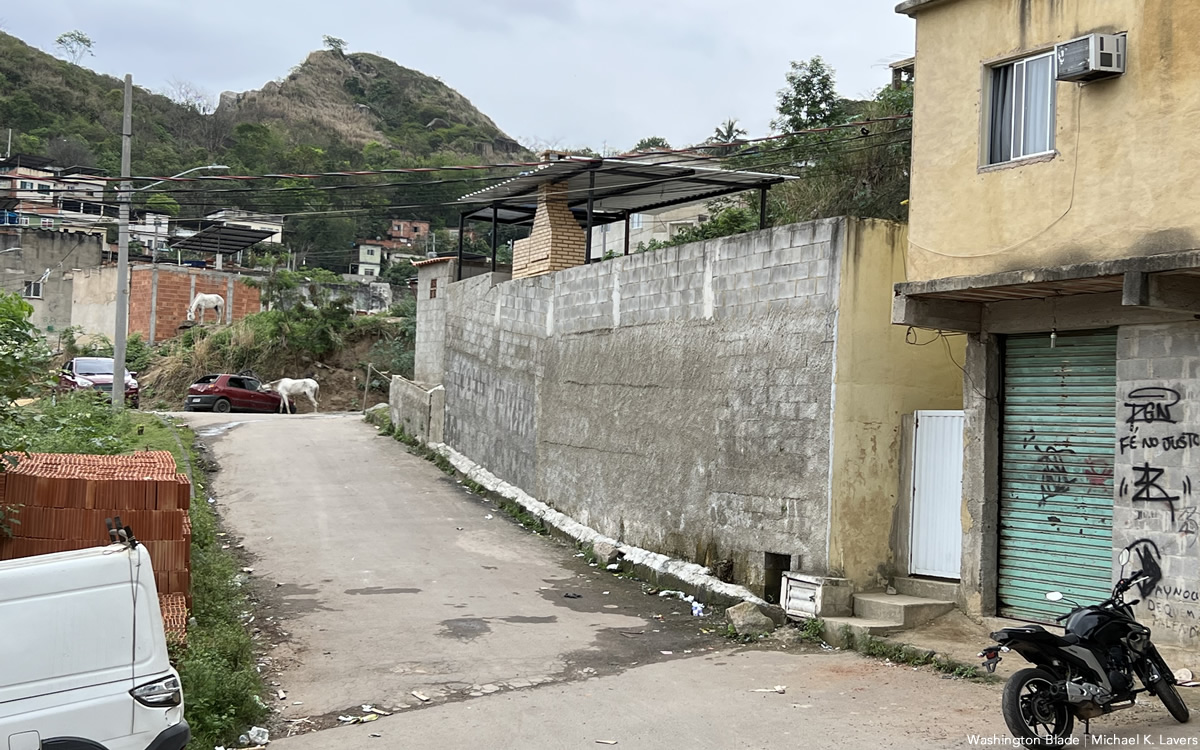
Seixas spoke with the Blade eight days after the presidential election’s first round, which took place on Oct. 2.
Da Silva defeated Bolsonaro by a 48.4-43.2 percent margin. They will face off in the presidential election’s second round on Oct. 30 because neither received a majority of votes.
Four of Bolsonaro’s previous Cabinet members — former Justice and Public Security Minister Sergio Moro, former Family and Human Rights Minister Damares Alves, former Agriculture Minister Tereza Cristina and former Science and Technology Minister Marcos Prutes — on Oct. 2 won seats in the Brazilian Congress. São Paulo Municipal Councilwoman Erika Hilton and Belo Horizonte Municipal Councilwoman Duda Salabert on the same day became the first openly transgender congresswomen.
Bolsonaro, a member of the right-wing Liberal Party, represented Rio de Janeiro in the Brazilian Congress from 1991 until he took office in 2018.
The former Brazilian Army captain has faced sharp criticism because of his rhetoric against LGBTQ and intersex Brazilians, women, people of African and indigenous descent and other groups.
He has encouraged fathers to beat their sons if they think they are gay.
Bolsonaro during a 2019 press conference in the White House Rose Garden stressed his “respect of traditional family values.” Bolsonaro has expressed his opposition to “gender ideology,” supports legislation that would limit LGBTQ-specific curricula in Brazil’s schools and condemned a 2019 Brazilian Supreme Court ruling that criminalized homophobia and transphobia.
A Brazilian Federal Police investigator in August called for prosecutors to charge Bolsonaro with incitement for spreading false information about COVID-19 after he said people who are vaccinated against the virus are at increased risk for AIDS. Bolsonaro’s efforts to discredit the country’s electoral system have increased concerns that violence could erupt if he does not accept the election results if he loses to Da Silva, a member of the leftist Workers’ Party who was Brazil’s president from 2003-2010.

Moro, who was a judge before he joined Bolsonaro’s government, in 2017 sentenced Da Silva to 9 1/2 years in prison after his conviction on money laundering and corruption charges that stemmed from Operation Car Wash. The Supreme Court in November 2019 ordered Da Silva’s release.
Julian Rodrigues, who was the coordinator of the Workers’ Party’s National Working Group from 2006-2012, noted to the Blade during a previous interview that Da Silva in 2004 created the Health Ministry’s “Brazil without Homophobia” campaign. Rodrigues also highlighted Da Silva created the Culture Ministry’s Diversity Secretariat that, among other things, funded community centers and sought to make police officers and other law enforcement officials more friendly to LGBTQ and intersex people.
Da Silva during the campaign has publicly highlighted his support of LGBTQ and intersex rights.
“We know that the fight against prejudice and homophobia is a daily fight,” said Da Silva in a campaign video that Associaçao Nacional de Travestis e Transexuais (National Association of Travestis and Transsexuals), a Brazilian trans rights group known by the acronym ANTRA, shared on its Instagram page. “I have a lot of respect for all the gay, lesbian, bisexual, travestis and trans people who live in Brazil.”
View this post on Instagram
Hilton is among Da Silva’s more outspoken supporters. Lou Lou, a bar in Rio de Janeiro’s Ipanema neighborhood, and other establishments in the country that are popular among LGBTQ and intersex Brazilians also indicate their support for Da Silva with prominently placed stickers.

Cláudio Nascimento, president of Grupo Arco-Íris de Cidadania LGBT (Rainbow LGBT Citizen Group), an LGBTQ and intersex rights group in Rio de Janeiro, on Oct. 9 handed the Blade a sticker that read, “no LGBT votes for Bolsonaro” (“Nenhum voto LGBT em Bolsonaro”) before he sat down for an interview at his office.
Nascimento said Bolsonaro’s government and the federal government “hasn’t done anything for the community.” Nascimento also stressed Bolsonaro’s comments against LGBTQ and intersex Brazilians and other minority groups.
“He has also made speeches,” Nascimento told the Blade. “He speaks against the LGBT community. It stimulates hatred, stimulates persecution and stimulates violence, discrimination.”
Nascimento said he supports Da Silva because he does not represent a threat to democracy.
“Our concern is that if Bolsonaro is elected, he will destroy democracy from within democracy,” said Nascimento.
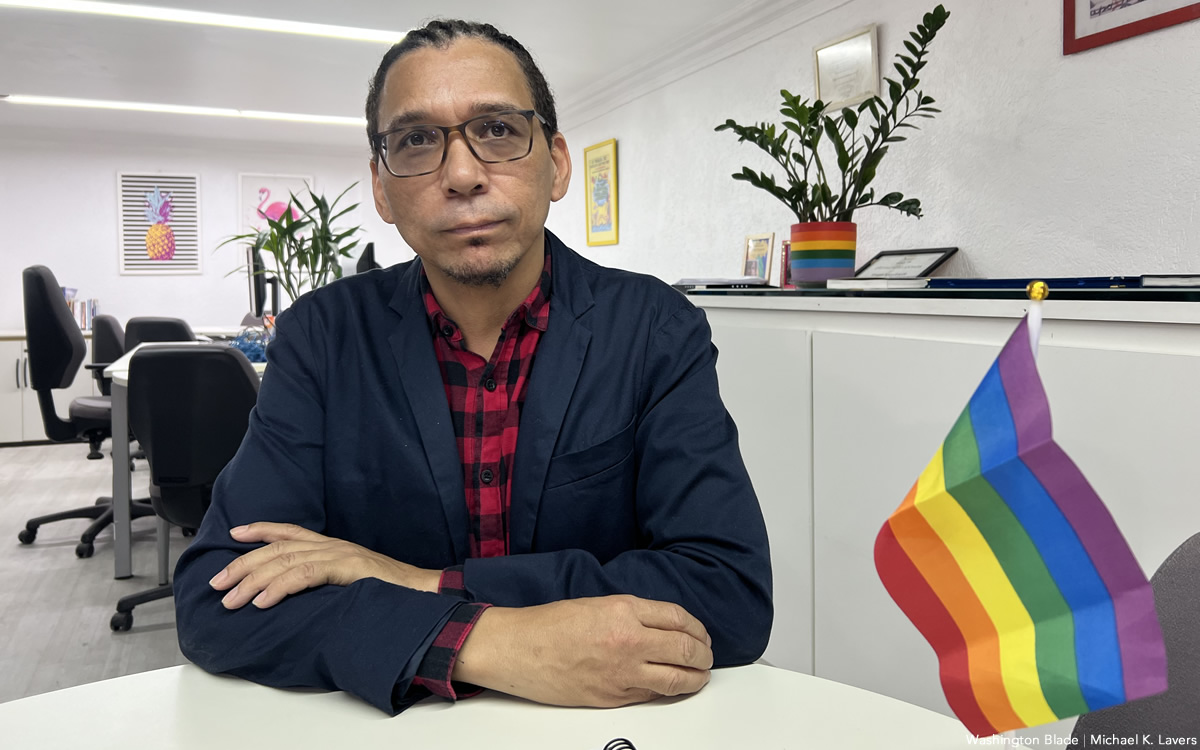
Patricia Mannaro, a lawyer who co-founded Aliança Nacional LGBTI (National LGBTI Alliance), a national LGBTQ and intersex rights group, echoed Nascimento when she spoke with the Blade at a São Paulo coffee shop on Oct. 5.
Mannaro said human rights in Brazil will “continue dying” if Bolsonaro wins re-election.
Voters in Lins, a municipality in São Paulo state, in 2012 elected Edgar Souza as their mayor.
Souza, who is Brazil’s first openly gay mayor, agreed with Mannaro when he spoke with the Blade on Oct. 6 at his São Paulo office.
“I am not voting for Lula because I’m in love with Lula,” said Souza. “I have a lot of criticism of Lula and the PT (Workers’ Party,) but Lula does not threaten democracy. He respects democratic rule and I respect institutions. He respects the separation of powers.”
“Bolsonaro would threaten all of that,” added Souza.

Renato Viterbo, vice president of Parada LGBT+ de São Paulo (São Paulo LGBT+ Parade) on Oct. 5 noted to the Blade during an interview at his office that marriage equality and most other LGBTQ and intersex rights advances in Brazil have happened because of court rulings, as opposed to legislation.
Viterbo said these advances could come under threat if Bolsonaro wins a second term, in part, because his party on Oct. 2 gained seats in Congress. Viterbo also stressed Bolsonaro continues to garner support in Brazil because he reflects attitudes that persist in the country.
“We are a sexist, anti-Semitic, racist and xenophobic country,” said Viterbo. “Democracy will be threatened if this government is reelected.”
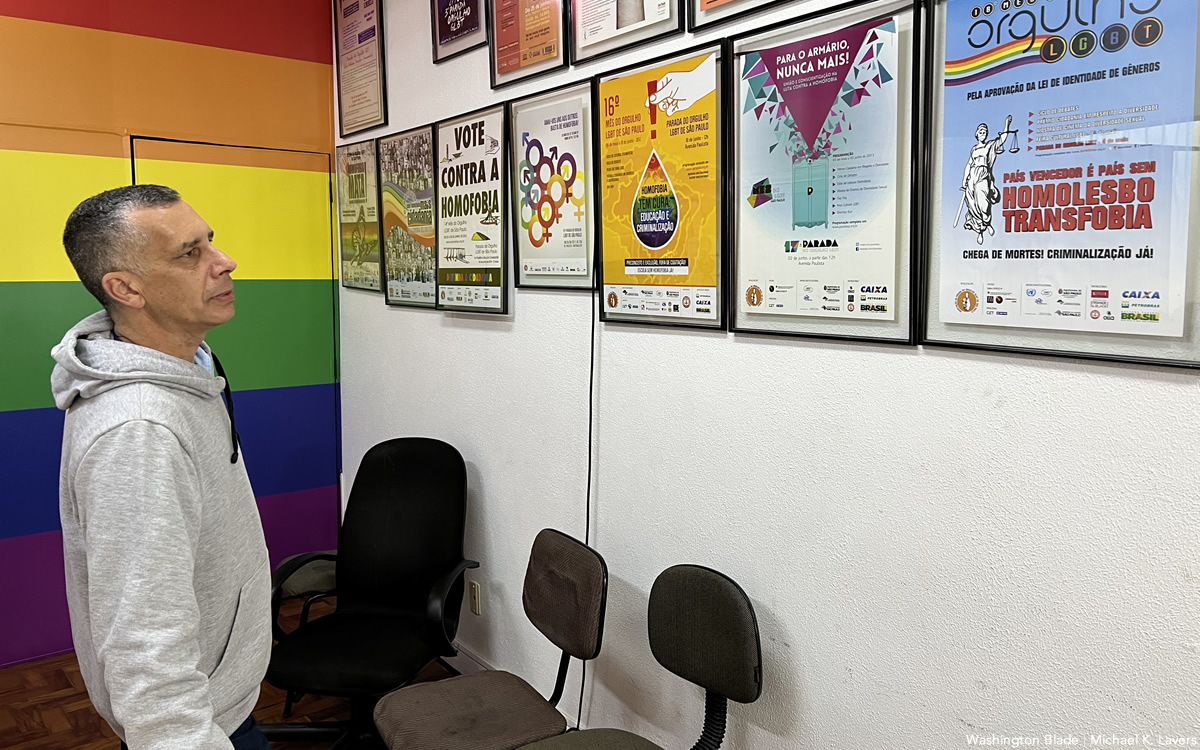
Colombia
Colombia avanza hacia la igualdad para personas trans
Fue aprobado en Comisión Primera de la Cámara la Ley Integral Trans

En un hecho histórico para los derechos humanos en Colombia, la Comisión Primera de la Cámara de Representantes aprobó en primer debate el Proyecto de Ley 122 de 2024, conocido como la Ley Integral Trans, que busca garantizar la igualdad efectiva de las personas con identidades de género diversas en el país. Esta iniciativa, impulsada por más de cien organizaciones sociales defensoras de los derechos LGBTQ, congresistas de la comisión por la Diversidad y personas trans, representa un paso decisivo hacia el reconocimiento pleno de derechos para esta población históricamente marginada.
La Ley Integral Trans propone un marco normativo robusto para enfrentar la discriminación y promover la inclusión. Entre sus principales ejes se destacan el acceso a servicios de salud con enfoque diferencial, el reconocimiento de la identidad de género en todos los ámbitos de la vida, la creación de programas de empleo y educación para personas trans, así como medidas para garantizar el acceso a la justicia y la protección frente a violencias basadas en prejuicios.
Detractores hablan de ‘imposición ideológica
Sin embargo, el avance del proyecto no ha estado exento de polémicas. Algunos sectores conservadores han señalado que la iniciativa representa una “imposición ideológica”. La senadora y precandidata presidencial María Fernanda Cabal anunció públicamente que se opondrá al proyecto de Ley Integral Trans cuando llegue al Senado, argumentando que “todas las personas deben ser tratadas por igual” y que esta propuesta vulneraría un principio constitucional. Estas declaraciones anticipan un debate intenso en las próximas etapas legislativas.
El proyecto también establecelineamientos claros para que las instituciones públicas respeten el nombre y el género con los que las personas trans se identifican, en concordancia con su identidad de género, y contempla procesos de formación y sensibilización en entidades estatales. Además, impulsa políticas públicas en contextos clave como el trabajo, la educación, la cultura y el deporte, promoviendo una vida libre de discriminación y con garantías plenas de participación.
¿Qué sigue para que sea ley?
La Ley aún debe superar varios debates legislativos, incluyendo la plenaria en la Cámara y luego el paso al Senado; pero la sola aprobación en Comisión Primera ya constituye un hito en la lucha por la igualdad y la dignidad de las personas trans en Colombia. En un país donde esta población enfrenta altos niveles de exclusión, violencia y barreras estructurales, este avance legislativo renueva la esperanza de una transformación real.
Desde www.orgullolgbt.co, celebramos este logro, invitamos a unirnos en esta causa impulsándola en los círculos a los que tengamos acceso y reiteramos nuestro compromiso con la visibilidad, los derechos y la vida digna de las personas trans. La #LeyIntegralTrans bautizada “Ley Sara Millerey” en honor de la mujer trans recientemente asesinada en Bello, Antioquia (ver más aquí); no es solo una propuesta normativa: es un acto de justicia que busca asegurar condiciones reales para que todas las personas puedan vivir con libertad, seguridad y respeto por su identidad.
Colombia
Claudia López running for president of Colombia
Former Bogotá mayor married to Sen. Angélica Lozano
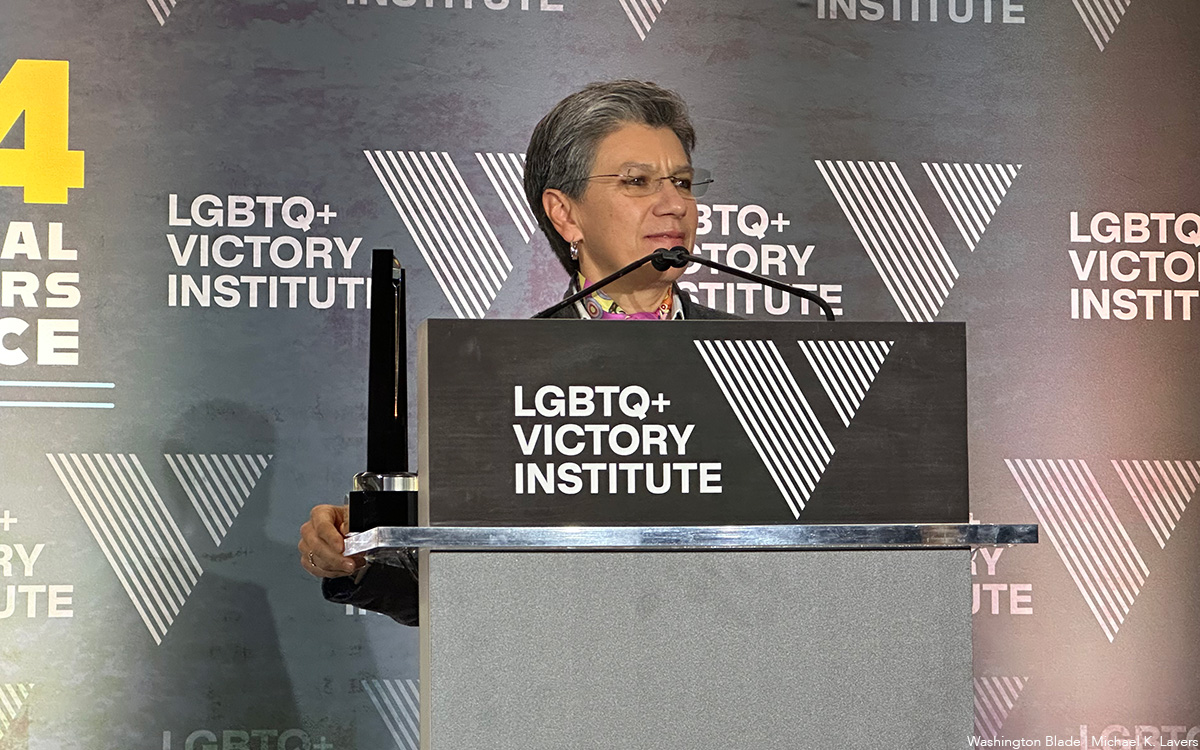
Former Bogotá Mayor Claudia López has announced she is running for president of Colombia.
“We begin today and we will win in a year,” she said in a social media post on June 3.
View this post on Instagram
López, 55, was a student protest movement leader, journalist, and political scientist before she entered politics. López returned to Colombia in 2013 after she earned her PhD in political science at Columbia University.
López in a speech she gave last December after the LGBTQ+ Victory Institute honored her at its annual International LGBTQ Leaders Conference in D.C. noted Juan Francisco “Kiko” Gomez, a former governor of La Guajíra, a department in northern Colombia, threatened to assassinate her because she wrote about his ties to criminal gangs.
A Bogotá judge in 2017 convicted Gómez of ordering members of a paramilitary group to kill former Barrancas Mayor Yandra Brito, her husband, and bodyguard and sentenced him to 55 years in prison.
López in 2014 returned to Colombia, and ran for the country’s Senate as a member of the center-left Green Alliance party after she recovered from breast cancer. López won after a 10-week campaign that cost $80,000.
López in 2018 was her party’s candidate to succeed then-President Juan Manuel Santos when he left office. López in 2019 became the first woman and first lesbian elected mayor of Bogotá, the Colombian capital and the country’s largest city.
López took office on Jan. 1, 2020, less than a month after she married her wife, Colombian Sen. Angélica Lozano. (López was not out when she was elected to the Senate.) López’s mayorship ended on Dec. 31, 2023. She was a 2024 Harvard University Advance Leadership Initiative fellow.
The first-round of Colombia’s presidential election will take place on May 31, 2026.
The country’s 1991 constitution prevents current President Gustavo Petro from seeking re-election.
López declared her candidacy four days before a gunman shot Sen. Miguel Uribe, a member of the opposition Democratic Center party who is seen as a probable presidential candidate, in the head during a rally in Bogotá’s Fontibón neighborhood.
She quickly condemned the shooting. López during an interview with the Washington Blade after the Victory Institute honored her called for an end to polarization in Colombia.
“We need to listen to each other again, we need to have a coffee with each other again, we need to touch each other’s skin,” she said.
López would be Colombia’s first female president if she wins. López would also become the third openly lesbian woman elected head of government — Jóhanna Sigurðardóttir was Iceland’s prime minister from 2009-2013 and Ana Brnabić was Serbia’s prime minister from 2017-2024.
Chile
Gay pharmacist’s murder sparks outrage in Chile
Francisco Albornoz’s body found in remote ravine on June 4

The latest revelations about the tragic death of Francisco Albornoz, a 21-year-old gay pharmacist whose body was found on June 4 in a remote ravine in the O’Higgins region 12 days after he disappeared, has left Chile’s LGBTQ community shocked.
The crime, which was initially surrounded by uncertainty and contradictory theories, has taken a darker and more shocking turn after prosecutors charged Christian González, an Ecuadorian doctor, and José Miguel Baeza, a Chilean chef, in connection with Albornoz’s murder. González and Baeza are in custody while authorities continue to investigate the case.
The Chilean Public Prosecutor’s Office has pointed to a premeditated “criminal plan” to murder Albornoz.
Rossana Folli, the prosecutor who is in charge of the case, says Albornoz died as a a result of traumatic encephalopathy after receiving multiple blows to the head inside an apartment in Ñuñoa, which is just outside of Santiago, the Chilean capital, early on May 24. The Prosecutor’s Office has categorically ruled out that Albornoz died of a drug overdose, as initial reports suggested.
“The fact that motivates and leads to the unfortunate death of Francisco is part of a criminal plan of the two defendants, aimed at ensuring his death and guaranteeing total impunity,” Folli told the court. “The seriousness of the facts led the judge to decree preventive detention for both defendants on the grounds that their freedom represents a danger to public safety.”
Prosecutors during a June 7 hearing that lasted almost eight hours presented conservations from the suspects’ cell phones that they say showed they planned the murder in advance.
“Here we already have one (for Albornoz.) If you bring chloroform, drugs, marijuana, etc.,” read one of the messages.
Security cameras captured the three men entering the apartment where the murder took place together.
Hours later, one of the suspects left with a suitcase and a shopping cart to transport Albornoz’s body, which had been wrapped in a sleeping bag. The route they followed to dispose of the body included a stop to buy drinks, potato chips, gloves, and a rope with which they finally descended a ravine to hide it.
Advocacy groups demand authorities investigate murder as hate crime
Although the Public Prosecutor’s Office has not yet officially classified the murder as a hate crime, LGBTQ organizations are already demanding authorities investigate this angle. Human rights groups have raised concerns over patterns of violence that affect queer people in Chile.
The Zamudio Law and other anti-discrimination laws exist. Activists, however, maintain crimes motivated by a person’s sexual orientation or gender identity are not properly prosecuted.
“This is not just a homicide, it is the cruelest expression of a society that still allows the dehumanization of LGBTQ+ people,” said a statement from Fundación Iguales, one of Chile’s main LGBTQ organizations. “We demand truth, justice, and guarantees of non-repetition.”
The Movement for Homosexual Integration and Liberation (Movilh), meanwhile, indicated that “since the first day the family contacted us, we have been in conversations with the Prosecutor’s Office so that this fatal outcome is thoroughly investigated, including the possible existence of homophobic motivations or components.”
The investigation into Albornoz’s murder continues, and the court has imposed a 90-day deadline for authorities to complete it.
-

 U.S. Supreme Court2 days ago
U.S. Supreme Court2 days agoSupreme Court to consider bans on trans athletes in school sports
-

 Out & About2 days ago
Out & About2 days agoCelebrate the Fourth of July the gay way!
-

 Virginia2 days ago
Virginia2 days agoVa. court allows conversion therapy despite law banning it
-

 Maryland4 days ago
Maryland4 days agoLGBTQ suicide prevention hotline option is going away. Here’s where else to go in Md.





